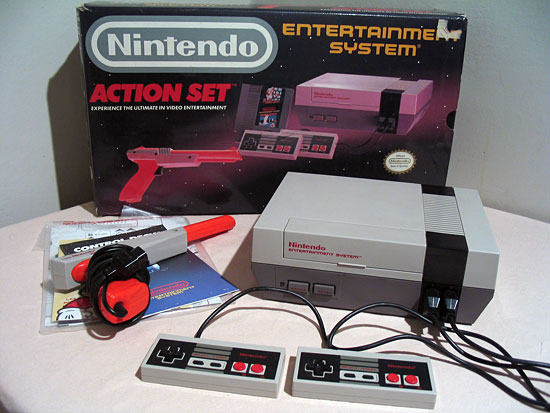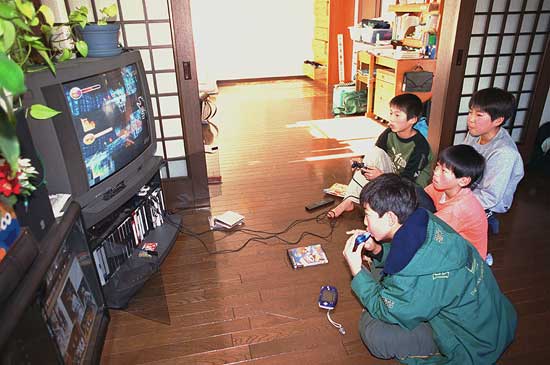Games have long been a way of socializing. Playing tag or hide and go seek as children, spin the bottle or truth or dare as teenagers, and games of charades or poker as adults are all ways we have come together as people to play. They’re also many of the ways we’ve learned to co-exist and interact with others.
Games in general bring people together for a common cause or goal. We feel safe to be ourselves within the rules of the game, and become more open to making friends by working towards the game objective. Games help us learn to work together with others as well as to discern what others are thinking, which are the building blocks to empathy.

A natural progression of games as a socialization tool leads us to video games.
When doing some research on the web for this post, I found many articles about video games and socialization. Almost all of them covered the stereotypical image of a gamer locked alone in their room with a controller in hand, and how that image has changed due to games becoming more social. I have a different take on this topic: Video games were meant to be social from the beginning.
Anyone remember when consoles came with two controllers?

Yeah, those were the days. When systems like the NES, SNES, and Sega Genesis came with two controllers, it was like we were expected to play with other people. It seems like the games from that era were also made to be simple to play with others. Just hit start to jump in and off you go!
Super Mario Bros., Donkey Kong Country, Mortal Kombat, Sonic the Hedgehog, Toejam and Earl, the list goes on. All of these games were so simple to play with your friends and family, because it was easy to join in and the majority of games had multiplayer options.
Some of my fondest memories are of coming home after school with my best friend and playing Mario Kart until my mom came home and said it was time for dinner. Others include playing Jeopardy Junior on the NES with my mom (…and the whole family, who always jumped in when I took too long to type in the answer).
Even single player games like Legend of Zelda: Ocarina of Time became social, because my entire group of friends would come over to play. When one of us couldn’t figure out a puzzle or had a hard time with a platforming piece, we would all jump in to help.

Ocarina of Time came out on one of the first systems to only have one controller included. While my friends and I made it a social experience, it seems as though around this time many more games were made to be for a single player. Don’t get me wrong, there were plenty of multiplayer games at the time too, but in order to play with others, you had to spend more money on another controller, and there were so many appealing single player games. The big games for me around that time were Legend of Zelda for Nintendo 64 and Final Fantasy VII for Playstation, for example.
This is where I believe the loner stereotype started to take shape. Graphics became better, games could be longer, and story could have more depth. RPGs like the Final Fantasy series would be compared in reviews by the number of hours of gameplay. With the price of games going up, I also think people wanted to make sure they were getting their money’s worth when they purchased a title.
With longer single player games that were high quality, it’s no wonder more people were sitting in their rooms alone with a controller to keep them company. They had to in order to get through the stories.

When Xbox and Playstation 2 were coming out, everyone was looking at the internet as the way of socialization. Those consoles were the first to have internet as a way of playing with others, although for PS2, you needed to purchase their broadband device (which had very few games that were compatible with it) and Xbox required a paid Xbox Live membership (which is still required to this day).
The next generation, PS3, Xbox 360, and Nintendo Wii, shows the current evolution of how playing with others works.
Sony decided that because it was behind the times with internet play, they would make it free for their gamers. This cut the barrier that Xbox had created with the pay for online play service, Xbox Live. They also made it possible to connect up to 7 controllers to the system (although who is gonna buy 6 more controllers?).
For Xbox 360 Microsoft kept things pretty much the same with their Xbox Live service, but it seems as though because of the pay for play service, a lot of people play online on Xbox. Most of those I’ve talked to with a PS3 don’t play online, but the Xbox players do. Many because they want to get their money’s worth.
For both of these systems (but in my honest opinion, more so with the Xbox) it can be difficult to figure out how to play together. I bought my fiance an Xbox for her birthday, and she doesn’t want to buy an Xbox Live membership. We tried to figure out how to play Halo 4 with each other…and it took forever. It seems as though the days of hanging out with friends at home and playing together are gone. Almost everything has been made easy to do online, but offline….good luck.
She and my roommate were looking for a game to play together yesterday…and they spent 15 minutes looking for something and gave up. You guys…it is ridiculous the number of games we have in our apartment, and they could not find a single one to play together. The days of picking up 2 controllers and hitting start to play together are gone.
Nintendo went a whole different direction with the Wii. You can play online with friends, but the best part is the ability to play and be active with friends in your own living room. Granted, you have to buy a bunch of controllers for many games, but some games let you take turns with your friends using just one controller. Nintendo decided that in person socialization was the way to go. Many game developers have created party games for the Wii to make it central to any gathering.

I’m not saying that Microsoft and Sony have ruined games as a means of socializing. Xbox and PS3 have some awesome social games, like Rock Band and Buzz, both designed for a larger group of people to play together and enjoy, even if they aren’t the ones playing the game.
What I’m saying is that console gaming has evolved. From a very social activity, to a less social activity, to a more social activity that is difficult to do in home, but awesome for over the net.
Some of the changes in gaming over the years have led to the image of the geeky guy locked in his dark bedroom, but we’re moving back toward a social way of being as gamers.
Giving geeky loner guy a headset gives him the capability of meeting others with his interests, and making new friends. Anonymity gives us more confidence because no one can see our face and we can always change our name (which can have negative results as well, a topic for another day).
As someone who plays games with friends online on her laptop, I get how the interconnectedness of being online feels awesome. It’s easy to keep track of friends, what they’re playing, and talk to people you otherwise might lose contact with.
I just wish it was easier to play with my friends in my own living room.
(Or at least easier to play capture the flag co-op with my fiance…competitive play could ruin my relationship…)

